37th Annual Evans Days Symposium Highlights Extensive, Important Research
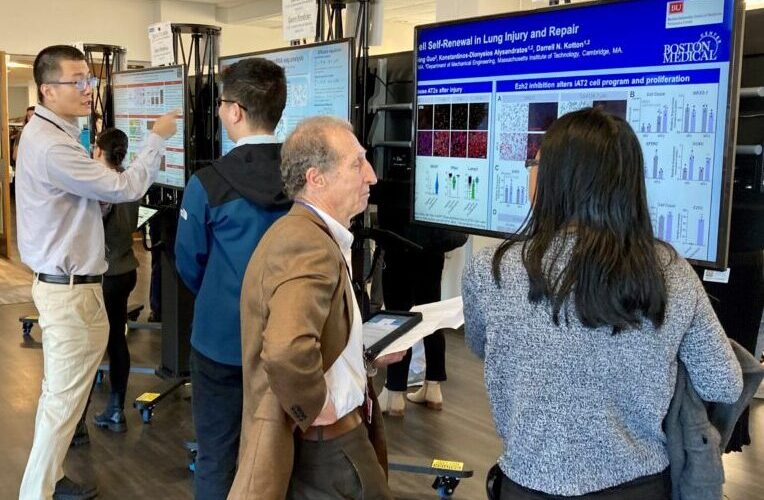
Tablet in hand, David Salant, MD, the Robert Dawson Evans Distinguished Professor of Medicine, paused briefly in his judging of the 160 poster presentations at the annual Department of Medicine Evans Days, to answer a question on what had changed over the 37-year history of the two-day symposium.
“The volume and quality of the science,” Salant explained succinctly.
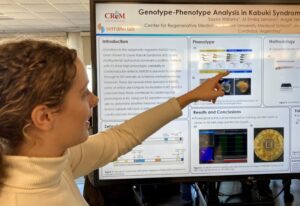
Held Oct. 19-20 this year, Evans Days highlights research carried out by trainees and faculty in the department of medicine and their collaborators across the Medical and Charles River campuses and are supported by the Evans Endowment. The endowment was established in 1912 by Marie Antoinette Evans with funding provided to what was then known as the Massachusetts Homeopathic Hospital, now Boston Medical Center (BMC). Intended to foster both research and teaching, the Evans Endowment supports both clinical and translational research and training and academic programs at the school and BMC.
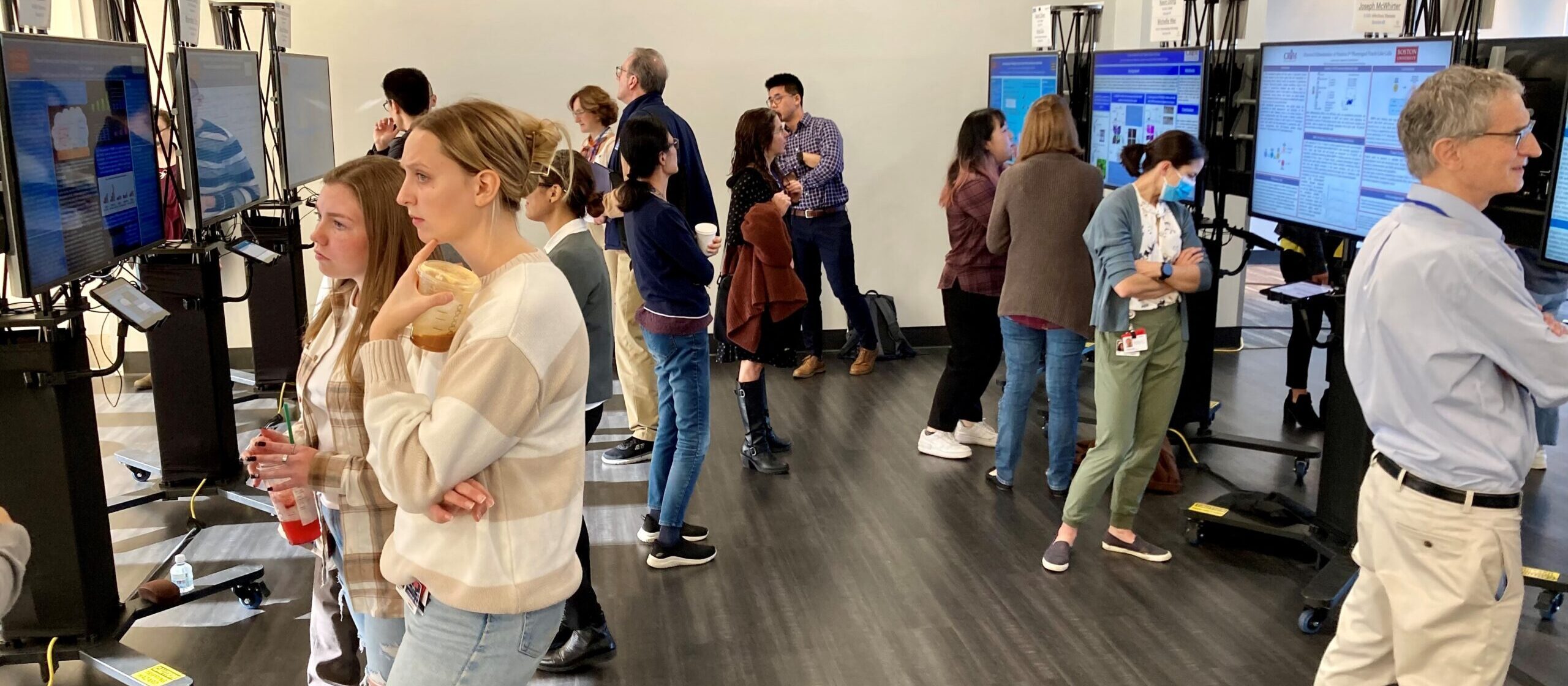
In addition to more than 150 posters and oral presentations, Evans Days hosts and features presentations by two eminent visiting professors, as well as ongoing research undertaken in Affinity Research Collaboratives (ARC). The ARCs are the building blocks of the Evans Center for Interdisciplinary Biomedical Research (ECIBR), founded in 2009 with Evans Endowment support to facilitate interdisciplinary approaches across the University. “Each ARC consists of investigators representing different disciplines bound by a common interest and focused on translational research,” said Katya Ravid, DSc, the Barbara E. Corkey Professor of Medicine and ECIBR founding director. To this end, during the 2023 Evans Days, participants heard from Jay Mizgerd, ScD, the Jerome S. Brody Professor of Medicine; Matthew Kulke, MD, the Zoltan Kohn Professor of Medicine; and Vijaya B. Kolachalama, PhD, associate professor of medicine, who presented reports focused on new discovery in their respective ARCs.
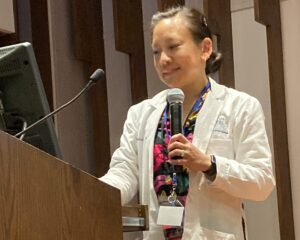
Newly featured this year was the David L. Coleman, MD, Junior Faculty Prize for outstanding research, citizenship and mentorship by an assistant professor. Assistant Professor of Medicine Anica Law, MD, MS, was named the inaugural recipient. Her presentation, attended by former Chair of Medicine Coleman, followed the ARC presentations and focused on the outcomes of critically ill patients who require long-term life support.
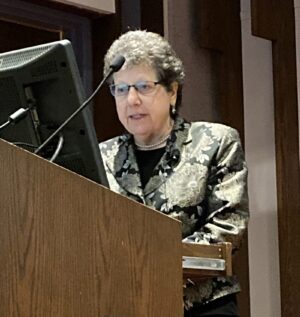
The 2023 Evans Days visiting professors, Barbara Kahn, MD, George R. Minot Professor of Medicine at Harvard Medical School, and Gbenga Ogedegbe, MD, MPH, the Dr. Adolph & Margaret Berger Professor of Population Health at New York University Grossman School of Medicine, addressed students, faculty and staff as the Wilkins Visiting Professor and the Ingelfinger Visiting Professor, respectively.
“I’m really impressed with the research you have going on here,” said Kahn in remarks prefacing her lecture in Keefer Auditorium Thursday, Oct. 19. “The posters were great; the short presentations were terrific; the collaboration, the energy, the enthusiasm, the cutting-edge nature of things — congratulations! It’s really been exciting to see.”
Kahn is regarded as one of the leaders in the field of glucose transport and is internationally known for her work on obesity and type 2 diabetes, uncovering the molecular mechanisms underlying fat storage cells, insulin and inter-tissue communication. She said she hoped to leverage the findings outlined in her lecture on signaling lipids that have an anti-inflammatory and anti-diabetic effects to protect against or prevent type 1 and type 2 diabetes.
Before her lecture, Kahn sat down with Anthony Hollenberg, MD, the John Wade Professor and chair of medicine, for an informal question-and-answer session exploring her career. Asked what gives her the greatest joy in her work, Kahn, who has trained more than 100 principal investigators and whom Hollenberg called “a builder of scientists,” said her greatest joy was in training the next generation of scientists, especially physician-scientists.
“It’s a major concern, I think, that physician-scientists are a dying breed,” Kahn said. “It gives me great gratification to take someone who has limited experience and help them not just with research skills but how do you choose a good question, how do you choose something that is going to be worth working on.” She also highlighted the immense importance of collaborative, interdisciplinary science.
Ingelfinger Visiting Professor Ogedegbe is a renowned expert on health disparities, with research focused on evidence-based interventions to reduce cardiovascular risk in minority populations. During his lecture on Friday, Oct. 20, in Keefer Auditorium, he shared how to use research to address health inequities in hypertension.
“Researchers and policy makers don’t talk to each other,” he said. “We focus on our grants. We focus on our papers. We focus on advancing our careers. The policy makers do what they do best – create policy that lacks evidence. Until we bridge that, we won’t be able to narrow the gap that we are seeing today.”
Ogedegbe proposed that programs to achieve health equity need to mitigate the adverse effects of social determinants of health like economic stability, access to quality education and health care, the communities where they live and work, and family and community interactions. He said researchers need to partner with Black communities to support strategies that support adoption of lifestyle changes. Providers need to work with payors to create community clinics, and researchers need to produce policy and data to drive action by stakeholders and policy makers.
It is also worth noting that the 2022 Wilkins Visiting Professor was the 2023 Nobel Prize winner Drew Weissman, MD, PhD (CAMED’87, GRS’87, Hon.’23).
For a list of the 2023 awards and poster winners click here. See more on Facebook.